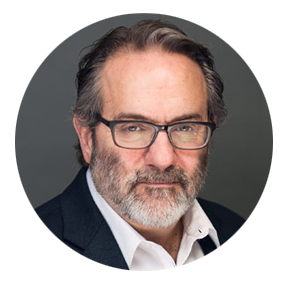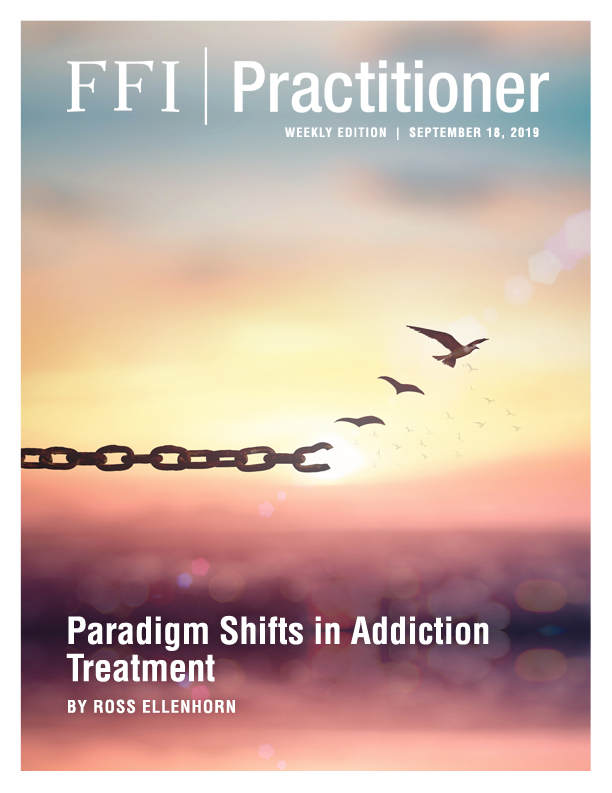Paradigm Shifts in Addiction Treatment

In this week’s edition, we feature an interview with FFI member and Miami conference presenter, Ross Ellenhorn, in which he discusses the paradigm shift that has, and continues, to reshape thinking on addiction treatment. Advisors and researchers in the field frequently encounter various forms of addiction in their work with clients, so his thoughts and insights provide a broader framework for understanding this complex issue both within and beyond family enterprises.
FFI Practitioner: Let’s start by talking about paradigm shifts, which are sometimes called sea changes, or revolutions, or metamorphosis. What’s your favorite term, and why and how does it describe what’s going on in addiction treatment?
Paradigms don’t shift only because of new scientific knowledge. It’s not like a new discovery happens and then suddenly, people start thinking differently. It takes a variety of things for people to notice the discrepancy in one paradigm and move to another. Partly that has to do with power, or certain ways in which things are happening in an economy, and, of course, in the way people are thinking at the time.
FFI Practitioner: Can you apply this thinking a bit more directly to substance abuse?
RE: With regard to substance abuse, we first approached it as a moral problem. But then, as things began to shift in our culture and we took on a more scientific approach to human behavior, that paradigm shifted to one in which we saw the problem as a disease. There was a discrepancy in thinking, however, since we saw the problem as both moral and as the result of a compulsion, i.e., something a person couldn’t control. The disease model leaned toward understanding that discrepancy as seeing a person’s brain as hijacked by chemicals. And… if the problem is purely a disease, then you have to eliminate one main cause of the disease: drugs –and the resulting criminalization that has occurred in the US.
In my opinion, at least two more discrepancies have now emerged. First is the fact that we are using a criminal approach for a medical problem. And second, why would you criminalize something a person can’t control?
This second discrepancy has made more treatment, rather than more incarceration, become the rallying cry, and we have begun to see a shift in how we help people get better. We start talking more about people in a human way: the problem is about deep psychological experiences, rather than something caused by the drug. Consequently, people need humane, caring treatments.
“…here’s the problem: research shows that the treatments we offer, as a whole, don’t work very well. Research also shows that people often do better in a more sustained recovery when they haven’t been touched by treatment.”
RE: The paradigm in addiction treatment has had this perspective that sees addiction as a disease, sees the person as diseased, and sees the person’s mind as diseased. Consequently, the person involved really can’t be completely in charge of how he or she gets better. Someone or some people need to intervene. So, the person as passive. This disease attacks them, and someone has to come and remove it, and the job of the diseased person is to participate in that. And if he or she doesn’t, he or she gets blamed.
And so, the current but changing addiction paradigm has been that people who don’t take the medicine of addiction treatment are doing something wrong because they’re diseased and aren’t following the rules of what diseased people are supposed to do. So, we put a lot of pressure on people to get into treatment. And here’s the problem: research shows that the treatments we offer, as a whole, don’t work very well. Research also shows that people often do better in a more sustained recovery when they haven’t been touched by treatment.1 So, we have another massive discrepancy, born from the disease idea about addiction: we basically force, cajole, and shame people into treatment that often doesn’t work.
So, the current shift is towards values that are much more rooted in psychotherapy. Psychotherapeutic values that put the person is the center of the change, making his or her own decisions as an autonomous being. The best that people can do around this person is help them recognize what they want to do to change their lives. That’s different than the hammer of assertively intervening on a hijacked brain.
Sidebar
The New Frontier: Disruption and co-creation in the field of family enterprise
October 23-25 | Miami 2019
Again, that approach isn’t just based on a new way of thinking, but on research we more or less ignored until the paradigm began to shift that very large numbers of people move from problem drinking to moderation without incident. Again, in the strictly disease model, addiction is like polio: you have to eradicate the whole thing—a little bit of the disease is unacceptable. The newer paradigm says we can accept a little use in many people, since we know that has worked.2
FFI Practitioner: Let’s talk about curiosity, which is central to Bowen Family Systems Theory, which is an important concept in advising multigenerational family enterprise in the FFI educational and professional models. How does curiosity play into the new addiction paradigm.
RE: I think I’ll answer that in two ways. Within a psychotherapeutic ethos, curiosity is fundamental. You’re having a curious relationship with the client when your therapy is working. In fact, your therapy is working because you’re being curious, not formulating. Formulation is the opposite of curiosity. Diagnosis is the opposite of curiosity. Labelling someone as an addict is the opposite of curiosity. And, once you engage in these curiosity-busting kinds of labels, you destroy the curative force of therapy. When I’m curious about you, my questions encourage you to come up with your own answers. When I label you, there’s not inquiry, because I’ve given you the expert answer.
So, the addiction field is currently full of anti-curiosity thought and narratives that the new paradigm replaces with inquiry, if you will. So that’s one answer.

The other answer is, yes, everybody is interconnected – in a variety of systems and relationships. So, in the end, since you can’t know what is happening for a person, curiosity is the better—and actually only–stance. I’m curious about what’s happening with another person, but not because I’m going to end up with a conclusion at the end. And that’s because a conclusion is actually impossible, since I can’t know everything that is happening to that person at that moment: again, they are just too interconnected to too many other things outside my office.
If we believe that we have the power to change our clients, then we don’t need to be curious. On the other hand, if we believe that our clients’ recovery and health depend on their getting in touch with that ability in themselves, then we have to be curious. Being curious leads to the right questions that clients can then ask themselves — and they can figure themselves out.
The old paradigm for addiction therapy—and, make no mistake–it’s still the most predominant paradigm–is that “I know what’s wrong with you.” We can figure it out. The new paradigm is “I can help you through my curiosity as you and I figure this out together.”
References
1Cohen, E., Feinn, R., Arias, A., & Kranzler, H. R. (2007). Alcohol treatment utilization: Findings from the national epidemiologic survey on alcohol and related conditions. Drug and Alcohol Dependence, 86(2-3), 214-221.
2Miller, W. R., & Rollnick, S. (2013). Motivational interviewing: helping people change. New York, NY, Guilford Press.

Related Articles

“Addiction and Family Business” by Jim Hutcheson

“Adapting to and Addressing Addiction Issues in a Family System” by Arden O’Connor

